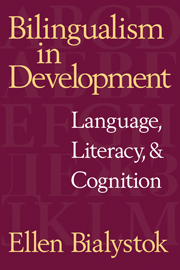8 - The Extent of the Bilingual Mind
Published online by Cambridge University Press: 02 December 2009
Summary
Who is this bilingual child, the epistemic subject of the inquiry recounted in the preceding chapters? Who is the hypothetical child whose brain has been glared at and whose language has been subjected to the equivalent of linguistic spectroscopy? To whom do the dictums, conclusions, and generalizations of this book apply?
The two central points asserted in Chapter 1 were, first, that bilingualism and bilingual children are as variegated as are individuals themselves and, second, that proficiency is at best elusive and at worst impossible to define as a standard for describing linguistic mastery. Although these claims set daunting limits on the possibility of learning anything coherent about bilingual children as a group, a picture nonetheless emerges that has structure and, hopefully, validity. The picture was created by making simplifying assumptions about the variability and the methodological barriers to studying the most difficult of the questions. The task now is to relax those assumptions and explore the territory that is included in the canvas, especially on the periphery. What happens when we extend the arguments across the boundaries set out by social class, learning circumstances, and educational opportunities?
This chapter is about extensions. It is an attempt to see how the patterns described here can apply to new situations and to different questions. It also explores an implicit set of questions that adults have about child bilingualism. These include some of the issues discussed earlier as well as questions about specific educational approaches, an issue not dealt with thus far.
Information
- Type
- Chapter
- Information
- Bilingualism in DevelopmentLanguage, Literacy, and Cognition, pp. 219 - 248Publisher: Cambridge University PressPrint publication year: 2001
